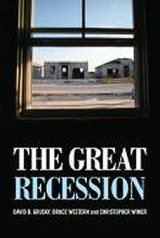|
The Great Recession
|
|
David B. Gursky, Bruce Western and Christopher Wimer, Editors
|

|

Officially over in 2009, the Great Recession is now generally acknowledged to be the most devastating global economic crisis since the Great Depression. As a result of the crisis, the United States lost more than 7.5 million jobs, and the unemployment rate doubled - peaking at more than 10 percent. The collapse of the housing market and subsequent equity market fluctuations delivered a one-two punch that destroyed trillions of dollars in personal wealth and made many Americans far less financially secure.
[…]The Great Recession is the first authoritative assessment of how the aftershocks of the recession are affecting individuals and families, jobs, earnings and poverty, political and social attitudes, lifestyle and consumption practices, and charitable giving.
The Great Recession turns to leading experts to examine whether the economic aftermath caused by the recession is transforming how Americans live their lives, what they believe in, and the institutions they rely on. Contributors Michael Hout, Asaf Levanon, and Erin Cumberworth show how job loss during the recession hit less-educated workers, men, immigrants, and factory and construction workers the hardest,
and where new jobs are appearing, they tend to be either high-skill positions or low-wage employment […]
Edward Wolff, Lindsay Owens, and Esra Burak find that young families, African Americans, and the middle class, experienced the most disproportionate loss - including mortgage delinquencies, home foreclosures, and personal bankruptcies. Lane Kenworthy and Lindsay Owens ask whether this recession is producing enduring shifts in public opinion akin to those that followed the Great Depression. Surprisingly, they find no evidence of recession-induced attitude changes toward corporations, the government, perceptions of social justice, or policies aimed at aiding the poor. Similarly, Philip Morgan, Erin Cumberworth, and Christopher Wimer find no major recession effects on marriage, divorce, or cohabitation rates. They do find a decline in fertility rates, as well as increasing numbers of adult children returning home to the family nest - evidence that suggests deep pessimism about recovery.
This protracted slump - marked by steep unemployment, profound destruction of wealth, and sluggish consumer activity - will likely continue for years to come. […]
|
|
